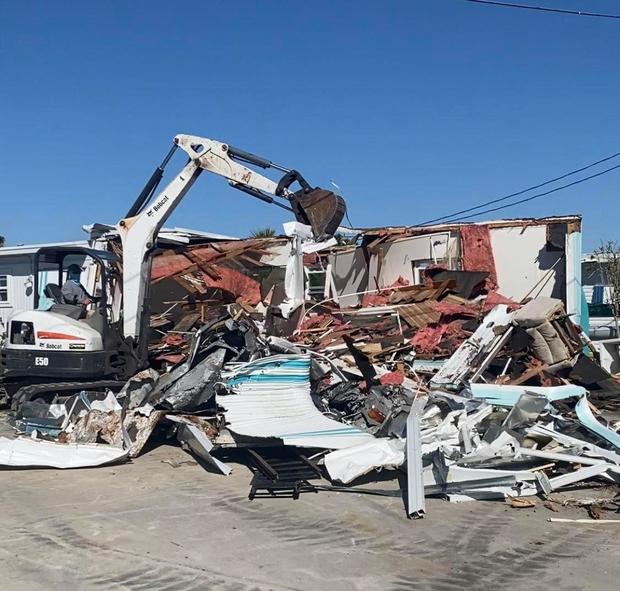Million of Americans are fleeing their homes because of extreme weather
In the 14 years he's been living on Florida's Pine Island, fishing captain Troy Creasy has evacuated just once, when Hurricane Ian slammed Cape Coral, Fort Myers and Pine Island in September. Creasy and his wife, Shelley, were gone for four months. They spent the winter in their home in upstate New York, then returned in mid-January to tear down the remains of their destroyed house and scrap Creasy's fishing boat — their main source of income.
Creasy, who said the Small Business Administration denied him a recovery loan four times, bought a replacement boat in January with savings and money raised on GoFundMe. He took his first fishing trip of the season last week. The couple is living in a camper while they rebuild — a process Creasy expects to take years. Still, he considers himself lucky.
"Some people lost the only home they have," Creasy, 60, told CBS MoneyWatch. Eleven of the 26 houses on his street have been torn down; a couple he knows in their 80s is living in their car, he said.
While Ian was one of the most destructive storms to hit the U.S. in recent years, Creasy's evacuation experience isn't unusual. More than a million Americans last year were forced from their homes for more than a month due to a weather disaster, according to a first-of-its-kind release from the Census Bureau.
When counting temporary evacuations lasting less than a week, the number balloons to more than 3.4 million — or 1.4% of the U.S. population. Of those who were forced to leave their homes because of weather disasters, nearly 40% returned within a week. But 20% stayed away longer than a month, while 16% said they never returned home.
Nearly half of the survey respondents left because of hurricanes; one-fifth said they evacuated because of flooding or fire and another 20% left for other reasons, according to the census data.
The census figures are far higher than other estimates of displacement. The International Displacement Monitoring Centre estimates that an average of 850,000 Americans were displaced by natural disasters every year over the past decade. And with climate change making extreme weather more frequent, academics who study displacement and disasters view such scenarios as the new normal.
The numbers show that "we're seeing increases in displacement," said Shannon Van Zandt, a professor of architecture at Texas A&M University who studies disaster recovery. However, Van Zandt cautioned against comparing Census figures to those from other institutions, noting that researchers use different methods to analyze the data.
The poor flee more often
The Census numbers also showed that poor people are much more likely to have to evacuate because of natural disasters. Of survey respondents with an income of $25,000 or less, 3.4% were forced to evacuate in the past year, compared with just over 1% of respondents making $200,000 or more. Nearly half of those making under $25,000 said they never returned home.
This tracks with other research showing that natural disasters hit poor people and people of color hardest. Flooding is more likely to affect lower-income people, who are more likely to live in a floodplain. And while not all disasters strike unequally, social inequalities are exacerbated in their wake.
"People who are on the margins of society before the disaster are most likely to evacuate, and farther from their home," said Lori Peek, director of the Natural Hazards at the University of Colorado Boulder and editor of a book about Katrina evacuees.
Without a car, people can find themselves struggling to return home from wherever they took refuge — something that was common in the wake of Hurricane Katrina, Peek noted. Poor people are also less able to pay for the cost to repair or rebuild their homes, as well as the sharply higher insurance costs that typically ensue following a natural disaster.
Rebuild or leave?
On Pine Island, where the typical household makes about $57,000 a year, Creasy said he sees many neighbors choosing to leave rather than shell out to rebuild and harden their homes against storms, which adds to the expense. And that's before accounting for the cost of insurance, which has roughly tripled. Creasy himself is paying four times what he paid last year to insure his fishing boat, he told CBS MoneyWatch.
"It's very emotional to watch your house taken down," he said. "Everything you worked so hard for, personal belongings, you weren't able to take with you."
"Flood insurance just went through the roof," Creasy added. "So maybe I can barely scrape by on the mortgage, but flood insurance is now $1,000 a month — where am I going to get that money?"
For now, however, Creasy said he wants to stay and rebuild.
"I can do other things, but I happen to love my job," he said, speaking with CBS MoneyWatch from Florida one morning on a sunny, 80-degree day. "Unless I wanted to change careers at 60 — I take people fishing, that's what I do."
Still, it's a choice he sometimes struggles with.
"We made the decision that yes, we're going to rebuild, and now we're down here and looking at everything around us and thinking, maybe we made the wrong move," Creasy said. "Then the next day it's beautiful and it feels great. Then you look at the cost of rebuilding, you can't afford it and you get depressed."
"I'm gonna make it one way or another," he added. "I have to — you're in business for yourself, and you have to make do."





